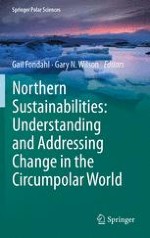2017 | OriginalPaper | Buchkapitel
7. Political and Fiscal Limitations of Inuit Self-Determination in the Canadian Arctic
verfasst von : Umut Riza Ozkan, Stephan Schott
Erschienen in: Northern Sustainabilities: Understanding and Addressing Change in the Circumpolar World
Aktivieren Sie unsere intelligente Suche, um passende Fachinhalte oder Patente zu finden.
Wählen Sie Textabschnitte aus um mit Künstlicher Intelligenz passenden Patente zu finden. powered by
Markieren Sie Textabschnitte, um KI-gestützt weitere passende Inhalte zu finden. powered by
